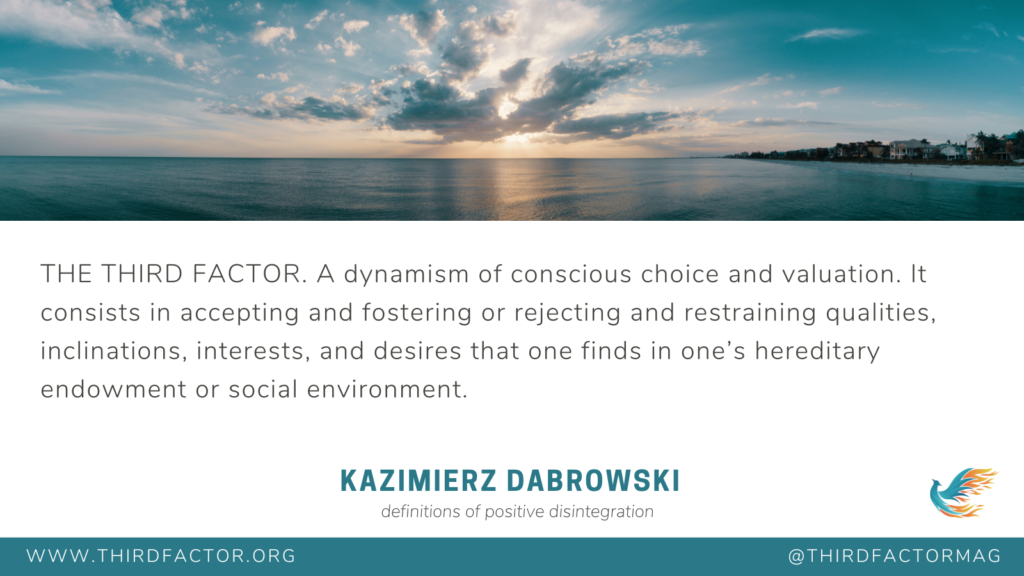There’s a narrative around “neurodivergence” that’s popular these days among the creative and intellectual people who find their way to this magazine. This narrative encourages people to label their divergent traits with diagnostic labels and separate themselves from “neurotypical” people. Often, they go so far as to separate themselves as a marginalized minority, in keeping with the political element intended by the woman who coined the term, Judy Singer, as she explains here.
There are grains of truth in this frame, as there are in most resonant narratives. I agree with some of what Singer says, and I hold my criticisms loosely. However, I’ve realized that need to state where I’m coming from because people who embrace this narrative are sometimes unpleasantly surprised by what they find at Third Factor.
The fact is that the neurodivergence narrative belies the purpose of this project. Third Factor is about harnessing and channeling unique talents and energies, yes, and certainly welcomes people who feel a bit different—but it is also about growth and overcoming and self-improvement. What’s more, we’re interested in a wide range of explanations for feeling different, not limited to the innate traits known in the theory of positive disintegration (TPD) as the “first factor of development.” By doubling down on first factor narratives that pin our problems to membership in an ever-inflating neurological class, we risk missing a lot of other reasons that a person may feel what in TPD is known as positive maladjustment. In this sense, I agree with Singer that sometimes (though not often) it’s not you, it’s the world.
In my experience, it’s when people identify very strongly with first-factor diagnostic labels—when they make these into identities—that they find our framing off-putting. Viewed from that angle, Third Factor’s narrative seems “invalidating.” Though we encourage embracing of unusual but constructive quirks, we also encourage change in certain contexts. This implicitly assumes that our readers are able to do so.
In this article, I’d like to explore a bit more what brings us together here at Third Factor, so you can decide for yourself whether we’re your cup of tea—and which narrative is most worth embracing.
Disability vs. Universal Human Struggle
Let me start with a necessary caveat: I believe the frame of disability is necessary and helpful. Even going beyond the most severely impaired, I know some people find labels like “ADHD” and “autistic” helpful in trying to understand why they interact with the world as they do. They have often been bullied, struggled in school or careers, and faced stigma, so it’s easy to see why they would be looking for some understanding.
I also know that people unite around shared struggles. This dynamic drives a lot of online communities; ours is no exception, given what we have said in the past about being a place for square pegs looking to escape round holes. So far, so good: we are a space for constructive discussions of quirks and their related challenges. And we do have some members with diagnoses of ADHD or autism who fit in great, who contribute a lot, and whom I feel fortunate to have here, though I ought to be honest and say that since most of our members do not share those traits, those members may face the same social challenges here that they face in other spaces not built specifically around their needs.
But those challenges are not (at least to my knowledge) the main reason some “neurodivergent-identifying” people have been disappointed here. Rather, the point of contention is the narrative they hold and seek to have mirrored back.
Here’s what I’ve observed: our so-called “neurodivergent” members fit their diagnoses into their personal narratives in a meaningfully different way than those who adopt neurodivergence as an identity. For the former group, the diagnosis points to a constellation of traits that is one part of them, not something they use as the framework for their whole autobiography, and not something that keeps them out of our space.
Our so-called “neurodivergent” members fit their diagnoses into their personal narratives in a meaningfully different way than those who adopt neurodivergence as an identity.
I will also note that while I’m not a fan of embracing labels as identities, they are useful tools for describing traits and conversing with others about them. There are some we use regularly here, including “superstimulable” and “abstract-intense,” which are broader terms to describe personality traits that are not disabilities (though they might predispose to certain disabilities). I use them to describe myself, too, though I try to hold them at arms’ length. Whatever I think they mean in my life today, I may learn tomorrow that that wasn’t quite right. It’s happened.
The Threshold to Disability
Now let’s consider the online conversation through which people find sites like ours.
These days, it’s easy to find lists on social media of the more endearingly quirky traits that people link with ADHD and autism. The picture painted in superficial conversations about intense interests or feeling socially awkward or struggling to focus is actually fairly broadly relatable. We’ve known for a long time that psychology students tend to diagnose themselves with everything in the textbook until they learn that these things are a matter of degree. The trick is figuring out where you fall on the range of human functioning, which a trained diagnostician can help with.
And here’s the thing: if you don’t really have a disability, then it’s not a good idea to tell yourself that you have one. This concern is echoed in the excellent book Saving Normal (Amazon Sponsored link) by Dr. Allen Frances. Dr. Frances was chair of the task force that assembled the DSM-IV, and he has been publicly critical of the process of putting together the edition that followed, in large part because of diagnostic inflation. In a section entitled “The Power to Label is the Power to Destroy,” Dr. Frances laments the way even an accurate mental diagnosis can mark someone in ways that have a negative impact, before going on to say this about misdiagnosis:
It is bad enough that stigma is so often associated with having a mental disorder. But the stigma that comes from being mislabeled with a fake diagnosis is a dead loss with absolutely no redeeming features. Labels can also create self-fulfilling prophecies. If you are told you are sick, you feel and act sick, and others treat you as if you are sick. The sick role can be enormously useful when someone truly is sick and needs respite and care. But the sick role can be extremely destructive when it reduces expectations, truncates ambitions, and results in a loss of personal responsibility. And when a society allows the overdiagnosis of a significant proportion of its individuals as “sick,” it becomes an artificially “sick” society rather than a resolutely resilient one. (109-10)
“Neurotypicals” and the Paradox of Weirdness
As I read that passage, I thought of a conversation I had recently with the mother of a high school student. Clearly an abstract-intense girl in her mom’s view, this young woman felt weird—painfully so. Being familiar (as teens are these days) with the neurodivergence narrative, she persuaded her skeptical mother to let her see doctor after doctor, searching for an ADHD diagnosis. It took a long time—most told her her struggles were normal—but she finally found one who gave her the explanation she craved.

I do not know this young person personally and, again, am not a diagnostician myself, so I can’t say for sure that this doctor didn’t finally get it right. What I can say is that feeling weird (especially in high school) is not weird at all—that it’s weirder not to feel weird in some way. Her mom thought perhaps the abstract intense framing could have been enough of an explanation, if only it were more widely known.
But in the end, regardless of how well they fit this or that label, the ways we differ from others are often salient to us in ways that they are not to others watching us. I call this the Paradox of Weirdness.
The ways we differ from others are often salient to us in ways that they are not to others watching us. I call this the Paradox of Weirdness.
Can “normal human weirdness” fit into the neurodiversity narrative, or is the latter rolling it up like a snowball tumbling down a hill? Though Singer regularly reminds people that neurodiversity is a property not of an individual but of the human population (a statement I fully agree with), she has also put forward the term “neurotypical.” As she writes:
It’s worth pointing out that the word “neurotypical” should not be read as a diagnostic term, i.e. one that has a specific set of signs and symptoms. It is purely a term developed to provide a necessary polar opposite of “neurodivergent”.
It seems to me that “neurotypical” is just “normal” (a term Singer dislikes) warmed over. But the word “normal” doesn’t bother me; what does is when, transmitted through the game of telephone that is the Internet and amplified through the lens of marginalization, it sounds like this: “I’m unusual and therefore I can’t help but struggle, but you guys are all normies who have it easy.”
To pick just one example out of a hat, I saw one #ADHDtwitter user lamenting how anxiety-inducing it was to sit at a desk waiting for someone to call to interview her for a job, especially when the call was late, suggesting this was a neurodivergent experience. While it’s true that some people are affected by anxiety to a debilitating degree, what this user described was striking in its normalcy. It makes me wonder whether, if she adjusted her narrative, she could take some comfort in the fact that the majority of human beings feel anxiety in this situation.
It’s a little weird how much some people want to believe that they’re weird.
To Know Thyself, Seek to Know Others
The thing is, exploring our own particular basket of weirdnesses is valuable. “Know Thyself” is ancient advice, carved in stone at the temple to Apollo at Delphi. To know ourselves, however, we must also know others.

This was what I found myself thinking when reading Divergent Mind (Amazon sponsored link) by Jenara Nerenberg. I received this book as a gift from someone who first read Third Factor and later became an in-person friend, and she generously shared it because it had helped her a great deal. I was touched by this, so I feel a little sheepish to bring it up to cite a criticism, but with apologies to my friend, here goes: Nerenberg often refers to “neurotypicals,” but she doesn’t seem to have interviewed any of them. They remain, as in Singer’s definition above, just “the Other”—a blank screen against which “divergent” people can enlarge their quirks.
I kept asking, “Are you sure it’s just you? At least some of the changes you seek would be good for many people.”
One thing I did really like about the book was how Nerenberg interviewed many people who are working to make constructive changes in their own lives and environments. That’s right up my alley, and I admired their agency. But I kept asking, “Are you sure it’s just you? At least some of the changes you seek would be good for many people.” There were certainly some that seemed especially targeted to autistic struggles, yes, but not all of them. Take the designer and conference organizer Nerenberg interviews about the impact of artificial lighting on mood and sleep (176). The designer seems to be saying that everyone can benefit from better design in workplaces. Nerenberg herself relates how, at a job interview, “I would present in a way that I knew was expected of me, but I would feel exhausted and wiped out the second I got home.” (174) It’s certainly possible that there was something unique about her form of exhaustion—a matter of degree—but as she wrote this, I wondered if she thought that “neurotypicals” are being “authentic” in job interviews and coming away from them buoyant and refreshed. In a job interview, you should be putting on some effort into how you come across, and I’ve certainly known “normies” who suggest this is exhausting. Perhaps the word “masking” doesn’t have quite the fidelity needed to differentiate between what’s common and what’s extreme. This would certainly encourage misunderstandings in the online game of telephone.
It sounded like she had moved through the labels and come to believe that she is simply an unrepeatable human being, just like every single one of us. If that were the path this exploration of labels tended to take—a necessary phase in an ordinary human being’s growth—I might let go of my criticism of this narrative.
All that said, I heard Nerenberg on a podcast some time after publishing her book, and I was more on board with her conclusion there. It sounded like she had moved through the labels and come to believe that she is simply an unrepeatable human being, just like every single one of us. If that were the path this exploration of labels tended to take—a necessary phase in an ordinary human being’s growth—I might let go of my criticism of this narrative.
But sometimes there’s a big clash along the way, if a person has made her struggles into an “identity.” That brings us to the specific disappointment that this site can trigger.
The Narrative of Positive Disintegration
An individual who is developing must feel badly in different periods of time, must be tormented by sadness, anxiety, depressions, inner and external conflicts. Without these experiences there is no development, there is no growth of self-awareness.
—Kazimierz Dabrowski (quoted in Mika, 2008)
I keep talking here about “narratives.” By this, I mean a framework for making sense of your life and the world and the story of you making your way through it. We build our narratives out of bits of observations—things that are true as far as we can tell, but never complete explanations of the world. And so we keep updating them, amending them as we have more experiences and acquire more wisdom. A narrative is a good one if it generally guides you in a constructive direction. Sometimes, if our narrative utterly fails us, we may swap it out whole-cloth for something new.
Now I’d like to describe to you the narrative that guides Third Factor Magazine.
Kazimierz Dabrowski, originator of the theory of positive disintegration, famously said that things like distress and anxiety—including severe forms—could actually be signs of mental health in a world where those feelings are often appropriate responses. Elizabeth Mika, a therapist and expert on Dabrowski’s work as well as an early contributor to Third Factor, wrote in an essay in Dabrowski’s Theory of Positive Disintegration (Amazon sponsored link) that a proper understanding of mental health described people who are
devoted to realization of the ever-higher hierarchy of values and show strong strivings toward growing and strengthening of underdeveloped parts in their personality. They exhibit signs of increased psychic excitability—especially emotional, imaginational, and intellectual—in addition to tendencies toward transcending their biological life cycle and psychological type, as well as stereotypical approaches to different areas of life such as education, sociology and psychology, psychopathology, and philosophy. Their life history is full of difficult experiences associated with their need for inner psychic transformation and self-perfection. (151-2)
I would argue that in this framing of mental health, the relevance of “neurodivergence” falls away as one transcends one’s psychological type in pursuit of those ever-higher values.
Dabrowski’s claim is a radical one. Maybe he’s right that you can transcend your nature and maybe he’s not. In studying his work and using his road map of positive disintegration as a guide to my own life, I’ve certainly found other areas in his work where I think he got it wrong. But here, I have faith that he is correct. If there’s one thing I find worthy of faith, it’s the internal locus of control, which Psychology Today defines as follows:
Locus of control refers to the degree to which an individual feels a sense of agency in regard to his or her life. Someone with an internal locus of control will believe that the things that happen to them are greatly influenced by their own abilities, actions, or mistakes. A person with an external locus of control will tend to feel that other forces—such as random chance, environmental factors, or the actions of others—are more responsible for the events that occur in the individual’s life.
Enter the Third Factor
Earlier, I mentioned that neurodivergence falls under TPD’s “first factor of development,” i.e., nature. The second factor is nurture, i.e., environmental influences. And then there’s the third factor of development, after which I named this magazine. Here is what that means, from one of Dabrowski’s primary source glossaries:

Aye, there’s the rub: rejecting and restraining qualities. That’s where the clash happens. If, in our exploration of the third factor, we bring up the possibility of cultivating an internal locus of control—of a capacity for self-management that enables you to transcend your first and second factors—we may seem to be “invalidating” the struggles of those who embrace the neurodiversity narrative. This is especially likely at the “high-functioning” end, which is where the clashes tend to happen, for obvious reasons.
This would obviously touch a nerve with people who perceive themselves as unable to do that. As to whether that perception is accurate in any individual’s case, I of course can’t say. I know that sometimes it is, in ways minor or major—even tragic. You’ll have to make that call yourself, with the guidance of a mental health specialist.
The narrative of positive disintegration includes painful things. It requires facing your weaknesses—of figuring out where it was you all along, so you can figure out what you can actually change. Shame, guilt, dissatisfaction with oneself, astonishment with oneself, inferiority toward oneself—these things are all considered dynamisms, or forces for growth and change, in the theory of positive disintegration.
In my narrative (which is working well enough for me, though I’m always amending it), I’ve made progress in part because I believed I could. I turned out to be mostly correct. And I don’t think this makes me unusual.
But there is plenty of encouraging content to be found in TPD, too. Dabrowski argued that inner psychic transformation is possible, and the stories of the exemplars as described by Dabrowski and Piechowski can give you guidance and faith that you can do this, too. While I don’t relate to the specific struggles of autism or ADHD and therefore have no expertise in overcoming them, I do have things I want to overcome, and I took heart from the examples of Eleanor Roosevelt and Robert F. Kennedy—superstimulable people whose life story follows a Dabrowskian trajectory. In my narrative (which is working well enough for me, though I’m always amending it), I’ve made progress in part because I believed I could. I turned out to be mostly correct. And I don’t think this makes me unusual.
We Are All On a Hero’s Journey
“I don’t need you to understand me. I just need you to believe that I’m having a human experience. Just believe I’m a person and I’m going through it.”
I know I believe you, because it takes one to know one.
—Dave Chapelle in conversation with his friend Daphne
In this sense, it is truly the neurodivergence narrative and not the diagnosis from which I wish to distance this project. I know people with these neurodivergent conditions—people who truly consider them disabilities—who have surmounted what held them back and what separated them from others. This jives with what I’ve heard from several therapists (at least one interview is forthcoming) and read or heard from several others: even if you have these conditions, you may well be able to grow out of them. The whole therapy profession, as one therapist told me, is grounded in a faith that this is possible, and his job would be a sham if that weren’t true. So you fit the criteria for ADHD? Okay, what’s your goal? Let’s work to change what you need to change to achieve that.

And on that note, I know someone with autism and someone with ADHD who I would count among the most emotionally mature people I know. They belong in the realm of Dabrowski’s level IV-V, having made obvious progress toward their personality ideals. If their lives are hard, well, they know that in that sense they’re no different from most other human beings.
So I will say this: if you claim “neurodivergence” and therefore people lower their overall standards for what they expect from you, they’re not actually “accepting” you.
Living Your Values and Doing the Thing
In the end, this is a site not about “neurodivergence,” but about sorting out your hierarchy of values and “Doing the Thing.” If you are looking to make constructive change, in the world or in yourself, then you fit in here, regardless of whether or how you are “divergent.”
If you are looking to make constructive change, in the world or in yourself, then you fit in here, regardless of whether or how you are “divergent.”
In upcoming issues, we’ll publish some articles exploring the intense feelings that rise up when a person is not living in line with his or her values, and illustrate people’s efforts to address this discrepancy. These stories often involve painful self-scrutiny and an effort to transcend one’s weaknesses before culminating in action that, they hope, will make a constructive change. This process, and these weaknesses, are not limited to the “neurodivergent.” Many weaknesses that must be overcome—fear, self-doubt, lack of wisdom, and so on—are incredibly typical.
Are You Okay?
Before they can get started on their own process of changes, I find that what most people want is reassurance that they are okay.
Unfortunately, dear reader, I (probably) don’t know you. I have heard nothing of your story or your thoughts, so I can’t promise that you are okay.
But I can say this much: if you can recognize your weaknesses (and remember that we all have them), and if you’re open to addressing them if only you can figure out how, then I’d be willing to bet on you being “okay.”
In an online space where that’s not always the point, I hope that what we build here will support your hero’s journey.
Header image by spukkato / iStock




